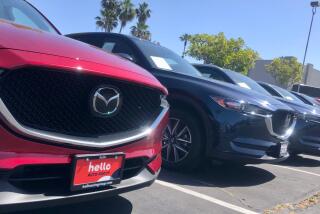Ford Settles 2 Accident Lawsuits
- Share via
Ford Motor Co., the world’s second-largest automaker, settled two lawsuits claiming that its vehicles had an electronic defect that led to sudden-acceleration accidents.
The automaker reached a confidential settlement with a California man, Douglas Pendleton, who claimed that a defect in the electronic system of his Crown Victoria had led to an accident in 1999 that left him paralyzed.
The suit was settled Dec. 19 as jurors began deliberations four weeks into a trial in San Jose, Pendleton’s attorney Thomas Murray said.
Ford settled a separate sudden-acceleration lawsuit in Philadelphia last month after jury selection began. Financial terms were not disclosed.
Ford said the settlements had no implications for similar lawsuits and that it was not responsible for either accident. Another sudden-acceleration case is scheduled to go to trial in Boston this month.
Though Ford has prevailed in most of the more than 500 sudden-acceleration cases filed since 1985, the settlements may lead to additional suits against the automaker, said Robert L. Rabin, a tort law professor at Stanford University who is not involved in the cases.
“Settlements are a kind of green light to plaintiffs’ lawyers, [a] signal that it’s worth proceeding,” he said.
“Unfortunately, it’s going to lead to a proliferation of these lawsuits,” said Daniel Genter, chief investment officer at Los Angeles-based RNC Genter Capital Management, which holds $1.6 billion of debt securities, including Ford bonds. “It’s like sticking a knife into the corporation. Once you have blood in the water, the sharks are going to appear.”
The lawsuits claim that a transient electrical charge activates the vehicle’s cruise control, causing uncontrollable acceleration, and that the brakes are unable to stop the vehicles.
Pendleton said his Crown Victoria suddenly accelerated as he shifted from park to drive. At trial, Pendleton’s attorneys asked a state court jury for about $10 million in compensation.
“A settlement does not mean that there was a vehicle defect,” company spokeswoman Kathleen Vokes said. Investigations by U.S., Canadian and Japanese officials have concluded that these accidents are “generally” caused by “pedal confusion,” she said.
“No matter what claims are made, there was no evidence shown during trial of any defect or malfunction in the subject vehicle’s cruise control, brakes or any other system,” Vokes said.
Before the jury’s deliberations began in the San Jose case, Santa Clara County Superior Court Judge Jamie Jacobs-May had rejected Ford’s motion to dismiss Pendleton’s claim for punitive damages, Murray said.
“I’m sure everybody who has one of these cases pending is hopeful Ford will be more willing to accept responsibility and not put people through lengthy trials to get a measure of justice,” Murray said.
In the Philadelphia case, accident victim Catherine Vaughn, who sustained minor injuries, claimed that her 1991 Lincoln Town Car had accelerated and hit seven cars before stopping.
Shares of Dearborn, Mich.-based Ford rose 51 cents to close at $16.59 on the New York Stock Exchange. Ford shares have risen about 71% in the last 12 months.






